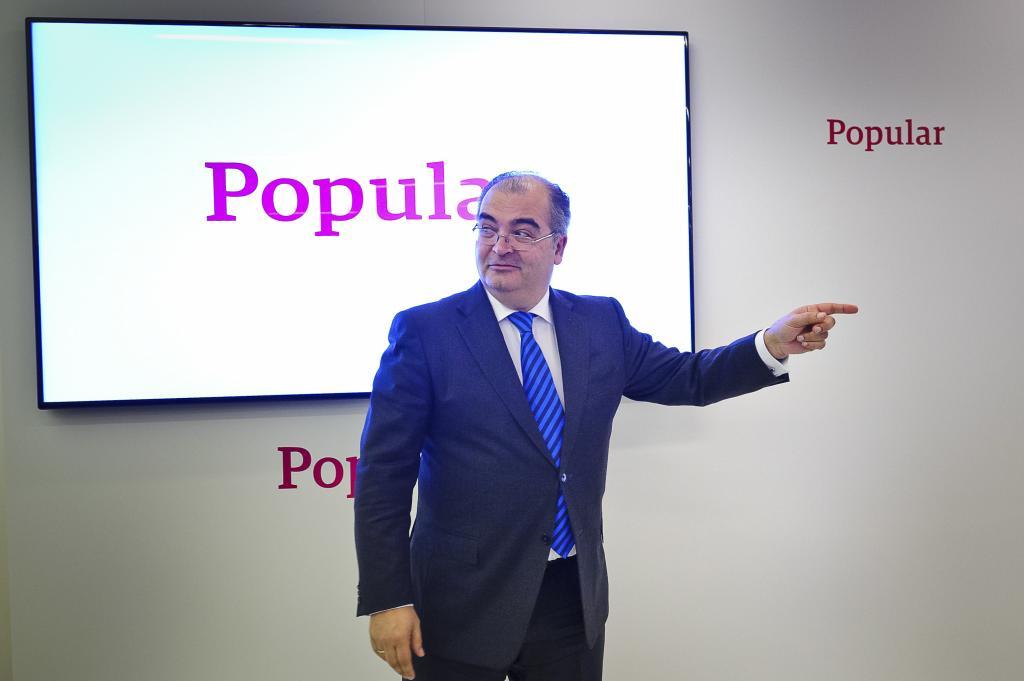The former president of Banco Popular, Ángel Ron, showed the difficulties that the entity had and five months before the debacle in which it was his last internal speech before the board of directors. The text of the speech, to which EL MUNDO has had access, shows that the entity had considerable losses and had no way out but a merger, "at the risk of losing independence," according to Ron.
The exbanquero has been summoned to declare today as accused in the National Court for corporate crimes, unfair administration, against the market, documentary falsification and misappropriation after doing so previously his successor in office, Emilio Saracho. Ron has maintained so far that the problem for bankruptcy of the entity was the subsequent management of Saracho, but in his last speech he did not hide his concern about the state of the entity. He said that "the situation is challenging for structural reasons" and mentioned "unprofitable assets that the bank must manage." For this he insisted before the directors repeatedly that "we must save time."
He ruled out as a first alternative to try a new capital increase just one year after 2016. "It is inadvisable because it could open the door to potential claims by shareholders who went to the previous increase, with the undesirable consequences they may have on the Bank and the administrators, "he said. He accompanied this argument with a report from the Linklaters law firm, chaired until just one month earlier by the current president of the National Securities Market Commission (CNMV), Sebastián Albella.
What to do then to sustain the entity? Ron opted for a merger. "Given this scenario, in my opinion the main alternative is to preserve the interests of shareholders and the bank. For this, the possibility of a corporate operation must be kept open, as the best way to guarantee it." Ron admitted that he inherited the presidency of the Popular Bank with the mandate of Luis Valls to keep it as an independent entity, but said at his farewell that he no longer saw it possible. "The strategy of gaining time to recover the bank's valuation and probing a possible independent is subject to unquestionable risks and it is the Council that must decide what actions to take."
Meanwhile, Ron advised "to execute divestment operations that generate capital internally and that allow us to visualize that the bank puts the entire fund in the management of its main challenges." He mentioned that "it is urgent to sell the bank in Florida" and argued that "the sale of Totalbank would allow today to generate more than 60 basis points of capital and a significant capital gain."
But the solution was to be absorbed by another bank. "Without a doubt, a corporate operation eliminates risks at the cost of losing independence." He said that he had not achieved strong enough offers to submit to the council, but he said that "the signs of interest of the large Spanish entities are firm , based on the share of business with SMEs that Popular has, the very strong generation of synergies -superiors to 3,000 million euros- and the use of deferred tax assets among other reasons. " Five months later, the bank, which was already bankrupt, was acquired by Banco Santander for a symbolic euro and BBVA gave up finally submitting an offer. Both banks, among others, had then been surveyed by Ron and, according to his version, "also allege the need for new provisions to reduce their final valuations and thus cover themselves against possible needs for additional provisions based on economic and regulatory developments. definitively, an operation of that nature is possible. "
Several advisors showed surprise at Ron's position, until then reluctant to mergers. The most critical, according to the minutes to which this newspaper has had access, was Vice President José María Arias Mosquera, who asked Ron why he now ruled out increasing capital when it had been what he had most defended to date. The then outgoing president took the opportunity to recriminate the existing division in the council and which had led to its replacement by Saracho. "The internal debate has gone out to the detriment of the image and the bank's own activity."
"First, the Council must remain united, the debates must be internal and must never leave this table. A credit institution cannot afford it without serious deterioration of its reputation. This should not be confused with the absence of debate, which is convenient if articulated and coordinated properly. "
According to the criteria of The Trust Project
Know more- National audience
- economy
JudgmentSaracho blames the 'storm of Murphy' the perfect storm in the Popular by communicating the restatement of accounts
BancaMadrid and Barcelona will concentrate 28% of Santander's offices after closures across the country
Companies Santander Bank closes these 175 offices today

